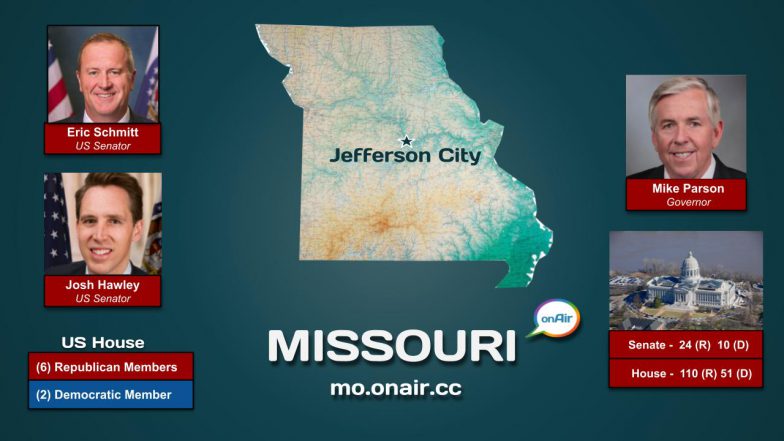Summary
Missouri is located in the Midwest region of the USA with Jefferson City as its capital. Mike Parson (R) is Governor.
The Missouri legislature has 34 Senate members and 163 House members. Elections are conducted using first-past-the-post voting in single-member districts of roughly equal population. Members of both houses of the General Assembly are subject to term limits. Senators are limited to two four-year terms and representatives to four two-year terms, a total of 8 years for members of both houses.
OnAir Post: Missouri onAir
News
The base content in each post in this Missouri onAir Hub has been updated as of 12/20/23. In addition to the eight posts on the home page, in depth posts on each US House member and posts on Missouri government and elections have been started. These posts have been shared with the US onAir Hub and will updated in the US onAir automatically when they are updated in this hub.
If your university or nonpartisan organization (such as a government focused research center, citizen engagement program or a League of Women Voters chapter) is interested in assisting the US onAir network to help curate new issue posts or other posts on this Hub and moderate the forums in each post, contact Ben Murphy at Ben.Murphy@onair.cc.
We are also supporting college students to start an onAir chapter on the their campus to coordinate the curation and moderation of posts especially on state and local representatives and government
About
The Missouri onAir Hub supports Missourians to become more informed about and engaged in local, state, and federal politics while facilitating more civil and positive discussions with their representatives, candidates, and fellow citizens.
- Missouri onAir is one of 50 state governance and elections hubs that the US onAir Network is providing to help reinvigorate US democracy. This post has short summaries of current state and federal representatives with links to their complete Hub posts. Students curate post content from government, campaign, social media, and public websites. Key content on the Missouri Hub is also replicated on the US onAir nations Hub at: us.onair.cc.
- Missouri students will be forming onAir chapters in their colleges and universities to help curate Hub content. As more students participate and more onAir chapters are started, we will expand to include more state and local content as well as increase the number of aircasts – student-led, livestreamed, online discussions with candidates, representatives, and the public.
Find out more about Who Represents Me in Missouri
Learn more about the US onAir Network
All hub content in onAir hubs is free to the public. Hub ontent is under the Creative Commons Attribution-NonCommercial license which permits content sharing and adaptation by nonprofit organizations as long as proper attribution is given to its author(s) and is used for non-commercial purposes. Content and moderation guidelines reinforce our commitment to fact-based, comprehensive content and civil and honest discourse.
To participate in aircast and post discussions, email usdemocracy@onair.cc and include your first name last name, and zipcode. Your real name and any other profile information will not be displayed unless you choose to do so. Your personal information is not shared with any other website or organization.
Hub membership will enable you to:
- Participate in issue and interview aircasts (student-led livestreamed discussions);
- Interact directly with post authors and curators giving them feedback, content suggestions, and asking questions;
- Ask questions, make suggestions, and give endorsement to representatives
Web Links
State Representatives
Governor Mike Parson
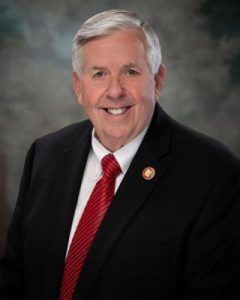 Current Position: Governor since 2018
Current Position: Governor since 2018
Affiliation: Republican
Parson served in the Missouri House of Representatives from 2005 to 2011 and the Missouri Senate from 2011 to 2017. He was elected lieutenant governor in 2016.
Parson has signed a bill criminalizing abortion after eight weeks of pregnancy and opposed Medicaid expansion. He oversaw the state’s response to the COVID-19 pandemic, issuing a temporary stay-at-home order in April 2020 but allowing schools districts to decide whether to close. Parson placed restrictions on mail-in voting during the 2020 U.S. elections, and oversaw Missouri’s reaction to the George Floyd protests
OnAir Post: Mike Parson – MO
US Representatives
Senator Josh Hawley
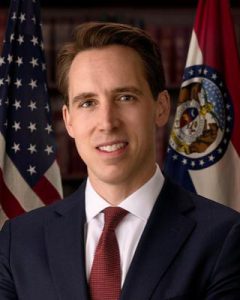 Current Position: US Senator since 2019
Current Position: US Senator since 2019
Affiliation: Republican
He was a law clerk to Tenth Circuit Judge Michael W. McConnell and Chief Justice John Roberts and then worked as a lawyer, first in private practice from 2008 to 2011 and then for the Becket Fund for Religious Liberty from 2011 to 2015. Before becoming Missouri attorney general, he was also an associate professor at the University of Missouri School of Law, and a faculty member of the conservative Blackstone Legal Fellowship.
In December 2020, Hawley provoked a political backlash when he became the first senator to announce plans to object to the certification of Joe Biden’s victory in the 2020 United States presidential election. He led Senate efforts to overturn the Electoral College vote count.
OnAir Post: Josh Hawley – MO
Senator Eric Schmitt
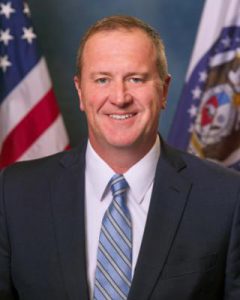 Current Position: US Senator since 2023
Current Position: US Senator since 2023
Affiliation: Republican
Schmitt served as the 43rd Missouri Attorney General from 2019 to 2023.
From 2005 to 2008, Schmitt was an alderman for Glendale, Missouri. He served as member of the Missouri Senate from 2009 to 2017, representing the 15th district. In 2016, Schmitt was elected Missouri state treasurer. On November 13, 2018, Governor Mike Parson named Schmitt attorney general of Missouri after the incumbent, Josh Hawley, was elected to the United States Senate. On November 3, 2020, Schmitt was elected to a full four-year term as attorney general. As AG, he filed lawsuits to have the Affordable Care Act invalidated by courts and sued school districts and municipalities for implementing mask requirements during the COVID-19 pandemic.
He was a partner at the firm Lathrop & Gage, LLP in Clayton, Missouri.[8] Schmitt served as an alderman for Glendale, Missouri, from 2005 to 2008; he was one of two aldermen for Ward 3.
OnAir Post: Eric Schmitt – MO
Bob Onder MO-03
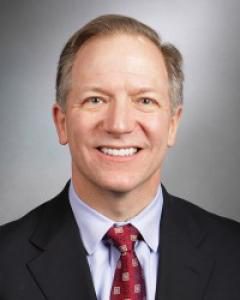 Robert Frank Onder Jr. (born January 6, 1962) is an American politician and physician from the state of Missouri. He is the member-elect for the United States House of Representatives in Missouri’s 3rd congressional district.
Robert Frank Onder Jr. (born January 6, 1962) is an American politician and physician from the state of Missouri. He is the member-elect for the United States House of Representatives in Missouri’s 3rd congressional district.
A Republican, he was a member of the Missouri Senate from 2015 to 2023, serving the 2nd District in the St. Charles area. Onder previously was a member of the Missouri House of Representatives from 2007 to 2008.
OnAir Post: Bob Onder MO-03
Ann Wagner MO-02
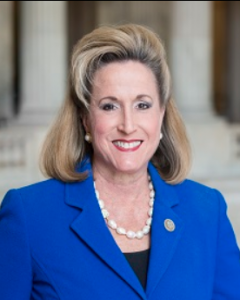 Current Position: US Representative of MO District 2 since 2003
Current Position: US Representative of MO District 2 since 2003
Affiliation: Republican
District: eastern portion of the state, primarily consisting of the suburbs south and west of St. Louis, including Arnold, Town and Country, Wildwood, Chesterfield, and Oakville.
Upcoming Election:
Ann Wagner was the United States Ambassador to Luxembourg from 2005 to 2009. After college, she worked in the private sector and held management positions at Hallmark Cards in Kansas City and Ralston Purina in St. Louis.
Her district, based in St. Louis County, is heavily suburban and the state’s wealthiest. It includes most of St. Louis’s southern and western suburbs as well as some of the northern exurbs in St. Charles County and the northern part of Jefferson County. Before her diplomatic post, Wagner chaired the Missouri Republican Party from 1999 until 2005; she co-chaired the Republican National Committee for four years, starting in 2001.
OnAir Post: Ann Wagner MO-02
Blaine Luetkemeyer MO-03
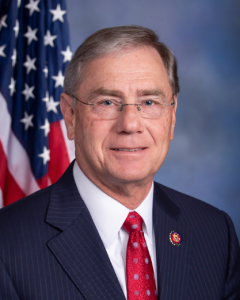 Current Position: US Representative of MO District 3 since 2009
Current Position: US Representative of MO District 3 since 2009
Affiliation: Republican
District: eastern and central portion of the state. It stretches from the southern part of Columbia (including the University of Missouri) and the state capital of Jefferson City in the west to St. Charles County (including the large suburbs of St. Charles, St. Peters and Wentzville) and western Jefferson County in the east.
Upcoming Election:
Luetkemeyer formerly served as a member of the Missouri House of Representatives. Blaine serves as Chairman of the Subcommittee on National Security, Illicit Finance, and International Financial Institutions.
Along with his strong agriculture background, Blaine is a small businessman, having been in the banking and insurance industry for over 30 years. He also served as a bank regulator for the state of Missouri earlier in his career.
OnAir Post: Blaine Luetkemeyer MO-03
Mark Alford MO-04
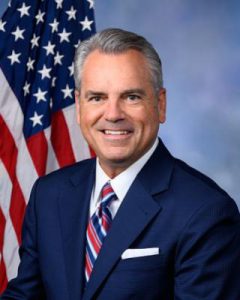 Current Position: US Representative of MO District 4 since 2023
Current Position: US Representative of MO District 4 since 2023
Affiliation: Republican
District: west-central Missouri. It stretches from the northern half of Columbia to the southern and eastern suburbs of Kansas City, including a sliver of Kansas City in Cass County and parts of Blue Springs in Jackson County. It also includes the northern portion of Columbia, home to the University of Missouri (but not the university itself).
Upcoming Election:
Mark Allen Alford Sr. is a former television news anchor.In 1998, he went to WDAF-TV in Kansas City as an anchor for Fox 4 News and stayed there for 23 years. He announced his resignation on October 8, 2021.
OnAir Post: Mark Alford MO-04
Emanuel Cleaver MO-05
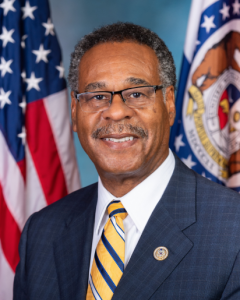 Current Position: US Representative of MO District 5 since 2005
Current Position: US Representative of MO District 5 since 2005
Affiliation: Democrat
District: he inner ring of the Kansas City metropolitan area, including nearly all of Kansas City and some of its suburbs in Clay and Jackson counties, including North Kansas City, Gladstone, Independence, Lee’s Summit, and some of Blue Springs. Upcoming Election
Emanuel Cleaver II is a United Methodist pastor who has represented Missouri’s 5th congressional district in the U.S. House of Representatives since 2005. Cleaver chaired the Congressional Black Caucus from January 2011 to 2013.
Cleaver served on the Kansas City Council from 1979 to 1991, until he was elected mayor, serving from 1991 to 1999.
Source: Wikipedia
OnAir Post: Emanuel Cleaver MO-05
Sam Graves MO-06
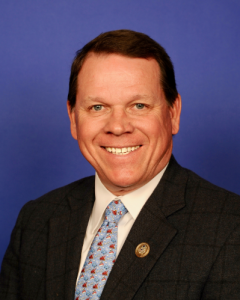 Current Position: US Representative of MO District 6 since 2001
Current Position: US Representative of MO District 6 since 2001
Affiliation: Republican
District: northern Missouri, stretching across nearly the entire width of the state from Kansas to Illinois. Its largest voting population is centered in the northern portion of the Kansas City metropolitan area and the town of St. Joseph.
Upcoming Election:
Graves is a general aviation pilot. He owns a Piper PA-11 Cub Special, is restoring a Beech AT-10, and co-owns a North American T-6 Texan and a Vultee BT-13 Valiant. Gould Peterson Municipal Airport is named after his uncle, an aviator, and is on his family’s farm. Graves is a Baptist.
Graves was elected to the Missouri House of Representatives in 1992.[7] After one term, he was elected to the Missouri Senate in 1994 and reelected in 1998.
Source: Wikipedia
OnAir Post: Sam Graves MO-06
Eric Burlison MO-07
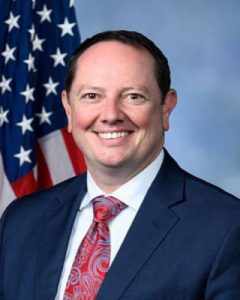 Current Position: US Representative of MO District 7 since 2023
Current Position: US Representative of MO District 7 since 2023
Affiliation: Republican
District: Southwest Missouri. The district includes Springfield, the home of Missouri State University, the Joplin, Missouri, metropolitan area, Missouri’s 5th largest, and the popular tourist destination city of Branson.
Upcoming Election:
Eric Wayne previously served as the representative for District 133 (Greene County) in the Missouri House of Representatives. A Republican, Burlison was elected to the Missouri House in 2008 and left office at the end of 2016. In 2018, he was elected to the Missouri Senate, representing District 20. He was elected to Congress in 2022.
Burlison was employed at CoxHealth as a software engineer before being promoted to business analyst. He now works for Cerner. Burlison is a member of the Freedom of Road Riders, Missouri Right to Life, National Rifle Association of America, and the Missouri Chamber of Commerce
OnAir Post: Eric Burlison MO-07
Jason Smith MO-08
 Current Position: US Representative of MO District 8 since 2013
Current Position: US Representative of MO District 8 since 2013
Affiliation: Republican
Positions: Chair, Joint Committee on Taxation; Chair, Ways and Means Committee
District: 30 counties, covering just under 20,000 square miles of southeastern and southern Missouri.
Upcoming Election:
Jason Smith served four full terms and one partial term in the Missouri House of Representatives, serving as the Majority Whip during the 96th Missouri General Assembly and as Speaker Pro Tem during the 97th Missouri General Assembly.
After passing the Missouri Bar in 2004, Smith practiced law at a local law firm in Cuba, Missouri. He also took over his family’s farm, just outside Salem, which has been in Smith’s family for four generations. At this time, he was a co-owner of a dog breeding business which his mother operated.
OnAir Post: Jason Smith MO-08
More Information
Wikipedia
Contents
The government of the U.S. state of Missouri is organized into the state government and local government, including county government, and city and municipal government.
While the state was originally a part of the Democratic-dominated “Solid South,” the state transitioned into a national bellwether at the start of the 20th century. Its position in the Midwest allowed for the state to become competitive for Republicans much earlier than many of its neighbors. After voting Republican twice in its entire history up to that point, it became a near-perfect bellwether and voted for the national winner all but once from 1904 to 2004.[1] However, the state has not voted Democratic since 1996.[2] In 2008, Democrat Barack Obama became the first Democrat to ever win the presidency without winning the state. The state’s rightward drift became apparent since, as in 2012, it voted for the losing candidate in consecutive elections for the first time since 1900. Republicans captured the state legislature and majority of House seats in the 2000s for the first time since the 1940s. Meanwhile, Democrats lost their last statewide office in the 2022 elections.
State government
Constitution
The fourth and last Constitution of Missouri, the state constitution, was adopted in 1945. It provides for three branches of government: The legislative, executive, and judicial.
Legislative branch
The legislative branch consists of the state legislature, which is the Missouri General Assembly; it is bicameral & comprises a 163-member House of Representatives (the lower house) and a 34-member Senate. Members of both houses are subject to term limits: Senators are limited to two four-year terms, and representatives to four two-year terms; a limit of 8 years for members of both houses.[3][4][5] The state constitution provides that “The general assembly shall meet on the first Wednesday after the first Monday in January following each general election. ..The general assembly shall reconvene on the first Wednesday after the first Monday of January after adjournment at midnight on May thirtieth of the preceding year.” As a part-time legislature, compensation is low, and most senators and representatives hold jobs outside their legislative duties. As of 2024, state legislators receive an annual salary of $40,000, as set by the Missouri Citizens’ Commission on Compensation for Elected Officials.[6] The General Assembly meets at the Missouri State Capitol in Jefferson City.
Executive branch
The executive branch is laid out in Article IV of the state constitution. It is headed by the governor of Missouri. The governor is charged with executing the laws of the state. The governor is elected a four-year term and can serve two terms and must be at least 30 years of age, a Missouri resident for at least 10 years, and a U.S. citizen for at least 15 years before holding office. He can also appoint members of the Cabinet of Missouri. There is also the Lieutenant Governor of Missouri, required to have the same qualifications as the governor, who is an ex officio president of the state Senate. The lieutenant governor is allowed to debate any and all questions before the Senate as a whole and may cast the deciding ballot in case of a tie. Additionally, the lieutenant governor assumes the office of governor in case of the governor’s death, resignation, or incapacitation. Missouri voters also elect the heads of several executive departments: the Missouri Attorney General, Missouri Secretary of State, State Treasurer of Missouri, and the State Auditor of Missouri. The requirements for holding these offices are the same as those for the governor, but only the State Treasurer has term limits similar to the governor.
Judicial branch
The judicial branch (the state courts) is established by Article IV of the Missouri Constitution. The state supreme court is the Supreme Court of Missouri – it is the highest court. The Missouri Court of Appeals is the state intermediate appellate court. It is split into three districts: Western (based in Kansas City), Eastern (based in St. Louis), and Southern (based in Springfield). The state trial courts of general jurisdiction are the 45 Missouri Circuit Courts and Associate Circuit Courts within each Circuit Court.
Seven judges sit on the Supreme Court of Missouri, which meets in the state capital, Jefferson City. Unlike the life tenure appointments of federal judges (including the Supreme Court of the United States), state supreme court judges hold the judicial bench for 12 years, as do judges of the Court of Appeals. Circuit Court judges have terms of six years and Associate Circuit Court judges have terms of four years. There are no term limits for judges, though there is a mandatory retirement age of 70 years.
Missouri pioneered a unique way of selecting judges for its state Supreme Court and Court of Appeals in an effort to remove some of the partisan politics from the selection process. Article V, Section 25(a) of the Missouri Constitution specifies a process, known as the Missouri Plan, to appoint judges to the state Supreme Court, Court of Appeals, and circuit and probate courts in the independent City of St. Louis, Jackson County (Kansas City), and any other circuit court where a majority of voters choose to adopt nonpartisan appointment (currently St. Louis County, Clay County, (St Charles County, Missouri) and Platte County). When a position becomes available in one of the above courts, a nonpartisan judicial nominating commission reviews applications, interviews candidates, and submits three nominees to the Governor. The Governor then appoints one of the three nominees to fill the vacant position. Finally, in the first general election one year or more after the appointment, the judge must be retained by the voters in a retention election before serving a full term. Judges for all other courts are elected directly by the voters.
County and city government
Counties with more than 85,000 people may elect their own charters, smaller ones must use the standard charter dictated by the state.
Missouri allows cities to adopt their own charter should they chose to do so; it was the first state in the union to do so.
Regardless of the freedom given to city governments, most municipalities choose to organize their local government around a mayor and a city council. Council members are typically elected in either citywide or district elections.
Political parties
| Year | Republican / Whig | Democratic | Third party(ies) | |||
|---|---|---|---|---|---|---|
| No. | % | No. | % | No. | % | |
| 1824 | 159 | 4.63% | 1,166 | 33.97% | 2,107 | 61.39% |
| 1828 | 3,422 | 29.36% | 8,232 | 70.64% | 0 | 0.00% |
| 1832 | 0 | 0.00% | 5,192 | 100.00% | 0 | 0.00% |
| 1836 | 7,337 | 40.02% | 10,995 | 59.98% | 0 | 0.00% |
| 1840 | 22,954 | 43.37% | 29,969 | 56.63% | 0 | 0.00% |
| 1844 | 31,200 | 43.02% | 41,322 | 56.98% | 0 | 0.00% |
| 1848 | 32,671 | 44.91% | 40,077 | 55.09% | 0 | 0.00% |
| 1852 | 29,984 | 43.58% | 38,817 | 56.42% | 0 | 0.00% |
| 1856 | 0 | 0.00% | 57,964 | 54.43% | 48,522 | 45.57% |
| 1860 | 17,028 | 10.28% | 58,801 | 35.52% | 89,734 | 54.20% |
| 1864 | 72,750 | 69.72% | 31,596 | 30.28% | 0 | 0.00% |
| 1868 | 86,860 | 56.96% | 65,628 | 43.04% | 0 | 0.00% |
| 1872 | 119,196 | 43.65% | 151,434 | 55.46% | 2,429 | 0.89% |
| 1876 | 145,027 | 41.36% | 202,086 | 57.64% | 3,497 | 1.00% |
| 1880 | 153,647 | 38.67% | 208,600 | 52.51% | 35,042 | 8.82% |
| 1884 | 203,081 | 46.02% | 236,023 | 53.49% | 2,164 | 0.49% |
| 1888 | 236,252 | 45.31% | 261,943 | 50.24% | 23,165 | 4.44% |
| 1892 | 227,646 | 42.03% | 268,400 | 49.56% | 45,537 | 8.41% |
| 1896 | 304,940 | 45.25% | 363,667 | 53.96% | 5,299 | 0.79% |
| 1900 | 314,092 | 45.94% | 351,922 | 51.48% | 17,642 | 2.58% |
| 1904 | 321,449 | 49.93% | 296,312 | 46.02% | 26,100 | 4.05% |
| 1908 | 347,203 | 48.50% | 346,574 | 48.41% | 22,150 | 3.09% |
| 1912 | 207,821 | 29.75% | 330,746 | 47.35% | 159,999 | 22.90% |
| 1916 | 369,339 | 46.94% | 398,032 | 50.59% | 19,398 | 2.47% |
| 1920 | 727,162 | 54.56% | 574,799 | 43.13% | 30,839 | 2.31% |
| 1924 | 648,486 | 49.58% | 572,753 | 43.79% | 86,719 | 6.63% |
| 1928 | 834,080 | 55.58% | 662,562 | 44.15% | 4,079 | 0.27% |
| 1932 | 564,713 | 35.08% | 1,025,406 | 63.69% | 19,775 | 1.23% |
| 1936 | 697,891 | 38.16% | 1,111,043 | 60.76% | 19,701 | 1.08% |
| 1940 | 871,009 | 47.50% | 958,476 | 52.27% | 4,244 | 0.23% |
| 1944 | 761,524 | 48.43% | 807,804 | 51.37% | 3,146 | 0.20% |
| 1948 | 655,039 | 41.49% | 917,315 | 58.11% | 6,274 | 0.40% |
| 1952 | 959,429 | 50.71% | 929,830 | 49.14% | 2,803 | 0.15% |
| 1956 | 914,289 | 49.89% | 918,273 | 50.11% | 0 | 0.00% |
| 1960 | 962,221 | 49.74% | 972,201 | 50.26% | 0 | 0.00% |
| 1964 | 653,535 | 35.95% | 1,164,344 | 64.05% | 0 | 0.00% |
| 1968 | 811,932 | 44.87% | 791,444 | 43.74% | 206,126 | 11.39% |
| 1972 | 1,154,058 | 62.29% | 698,531 | 37.71% | 0 | 0.00% |
| 1976 | 927,443 | 47.47% | 998,387 | 51.10% | 27,770 | 1.42% |
| 1980 | 1,074,181 | 51.16% | 931,182 | 44.35% | 94,461 | 4.50% |
| 1984 | 1,274,188 | 60.02% | 848,583 | 39.98% | 0 | 0.00% |
| 1988 | 1,084,953 | 51.83% | 1,001,619 | 47.85% | 6,656 | 0.32% |
| 1992 | 811,159 | 33.92% | 1,053,873 | 44.07% | 526,533 | 22.02% |
| 1996 | 890,016 | 41.24% | 1,025,935 | 47.54% | 242,114 | 11.22% |
| 2000 | 1,189,924 | 50.42% | 1,111,138 | 47.08% | 58,830 | 2.49% |
| 2004 | 1,455,713 | 53.30% | 1,259,171 | 46.10% | 16,480 | 0.60% |
| 2008 | 1,445,814 | 49.36% | 1,441,911 | 49.23% | 41,386 | 1.41% |
| 2012 | 1,482,440 | 53.64% | 1,223,796 | 44.28% | 57,453 | 2.08% |
| 2016 | 1,594,511 | 56.38% | 1,071,068 | 37.87% | 162,687 | 5.75% |
| 2020 | 1,718,736 | 56.71% | 1,253,014 | 41.34% | 58,998 | 1.95% |
| 2024 | 1,751,986 | 58.32% | 1,200,599 | 39.97% | 51,512 | 1.71% |
Like the rest of the nation, the two dominant parties in Missouri are the Democratic Party and the Republican Party (whose state affiliates are the Missouri Democratic Party and the Missouri Republican Party, respectively). The state secretary of state also recognizes the Constitution Party and Libertarian Party as organized parties,[8] although only five Libertarians currently hold elected office in Missouri.[needs update][citation needed]
The Democratic and Republican parties have been responsible for establishing the voting districts, casting votes in the Electoral College, and fielding candidates for the general elections, and helping to determine legislative policy and priorities.
Federal representation
Missouri currently has eight House districts. In the 119th Congress, two of Missouri’s seats are held by Democrats and six are held by Republicans:
- Missouri’s 1st congressional district represented by Wesley Bell (D)
- Missouri’s 2nd congressional district represented by Ann Wagner (R)
- Missouri’s 3rd congressional district represented by Bob Onder (R)
- Missouri’s 4th congressional district represented by Mark Alford (R)
- Missouri’s 5th congressional district represented by Emanuel Cleaver (D)
- Missouri’s 6th congressional district represented by Sam Graves (R)
- Missouri’s 7th congressional district represented by Eric Burlison (R)
- Missouri’s 8th congressional district represented by Jason Smith (R)
Missouri’s two United States senators are Republicans Josh Hawley and Eric Schmitt, serving since 2019 and 2023, respectively.
Missouri is part of the United States District Court for the Eastern District of Missouri and the United States District Court for the Western District of Missouri in the federal judiciary. The district’s cases are appealed to the St. Louis-based United States Court of Appeals for the Eighth Circuit.
See also
References
- ^ “Missouri Presidential Election Voting History – 270toWin”.
- ^ Leip, David. “Presidential General Election Results Comparison—Missouri”. US Election Atlas. Retrieved September 6, 2023.
- ^ “Archived copy” (PDF). Archived from the original (PDF) on 2008-10-29. Retrieved 2008-09-11.
{{cite web}}: CS1 maint: archived copy as title (link) - ^ “Missouri House of Representatives – Error”.
- ^ “Did You Know – Facts About the Missouri Senate”. www.senate.mo.gov. Retrieved 7 April 2018.
- ^ “Missouri Legislator Compensation”. Ballotpedia. Retrieved 2025-09-15.
- ^ Leip, David. “Presidential General Election Results Comparison—Missouri”. US Election Atlas. Retrieved November 17, 2025.
- ^ IT, Missouri Secretary of State -. “Established Political Parties”. s1.sos.mo.gov. Retrieved 7 April 2018.
External links
